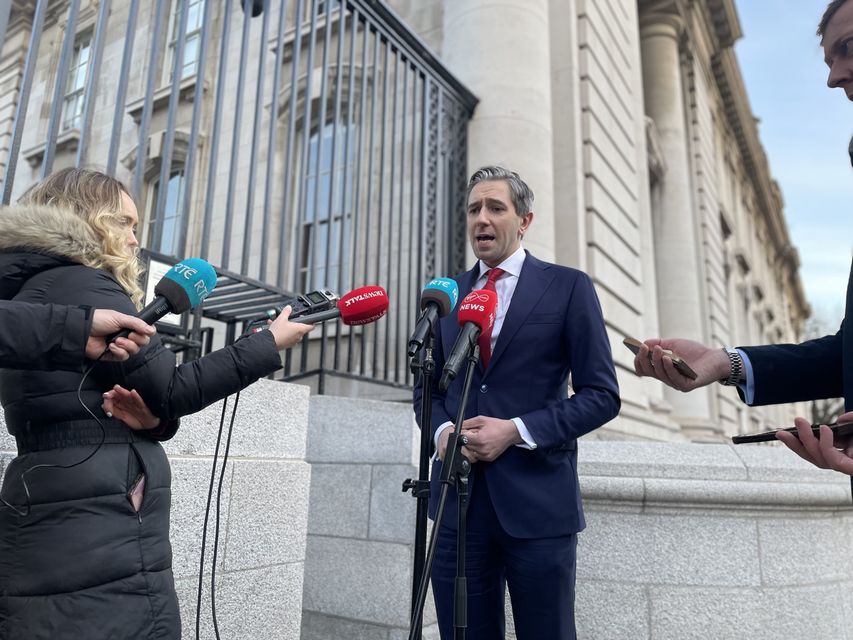The Tanaiste has called suggestions by the ESB that customers would pay for damage caused by Storm Eowyn “extraordinarily insensitive”.
ESB chief executive Paddy Hayes said that damage done by the unprecedented storm to the electricity network would be “significant” and run into the tens of millions.
“It’s likely that those charges which are allowed there will find their way back into the overall cost of our distribution system network,” he told RTE on Tuesday.
“There is a cost associated with this that will ultimately be borne across the electricity network as a whole.”
Mr Hayes also said that the Public Service Obligation (PSO) levy would still be charged to customers who were without power, as it funds investment in the network.
Tanaiste Simon Harris said the comments were “extraordinarily insensitive” and a “slightly more sensitive approach” was needed.
He added: “We can have discussions about how best to invest – including the size of the ESB’s surplus, by the way, and the dividends and the resources available to the ESB – but when my constituents or certainly citizens in the country of which I’m Tanaiste haven’t had the lights on for two weeks, I’d appreciate a slightly more sensitive approach in relation to these matters.
“There are very big issues here that need to be addressed.
“We can’t continue to have a situation where we’re investing millions and millions of euro through the ESB and repairing lines when the trees are falling down on top of them.
“We need to have a plan in terms of how we protect the ESB’s infrastructure.
“The cost of electricity is something that stresses people in this country.
“It worries people, and I don’t want any person to be worried about the cost of heating the home, cost of turning on the lights.
“And I also don’t want people, when they can’t turn on the lights, be hearing the response from the state agency in relation to the lights, saying we’re going to put up your bills.”
Asked about whether customers would not pay for the storm costs, he said: “What I can say to people is, when it becomes apparent what the full costs of that repair is, Government will have to engage with all of the various utilities and all of the various Government departments, and that work will take place.”
Taoiseach Micheal Martin refused to be drawn to comment on the remarks by Mr Hayes.
He said his focus is on ensuring there is a “rigorous evaluation” of the country’s response to Storm Eowyn, which he said was the most “severe in living memory”.
Mr Martin said: “ESB networks have never seen anything like this in terms of the impact on the power lines and on the grid.
“Likewise, Irish Water have never seen the likes of this in terms of the impact on the waste water treatment plants and supplies and so on.
“And also, then the investment in local services, local networks, which did prove very effective in terms of the investment in sporting clubs, the investments in various rural schemes that have developed over recent times.
“We want to institutionalise that more, that we would have focal points in every part of the country that would be resourced better, in terms of generators and so on.
“We want to work on that.
“We also have to work on making the grid more resilient and there will be a lot of investment.
“There will be massive investment in the grid over the next five years.
“Obviously, the regulators will be examining the price review that’s due to come.
“We’ve accelerated some aspects of that, and the minister has asked for a plan within the next month in terms of enhancing the grid.”
When asked again about costs being passed on to ESB customers, Mr Martin said: “We will work that out in the sense that the State can also intervene, the cost involved in repairing and restoring will be nowhere near the cost of actually enhancing the grid.
“So for example, last five years, you’re looking at five billion investment in the grid.
“One could be looking at anything from 11 billion to 13 billion investment in the grid, from 2025 to 2030.”
There are 7,000 people still left without power, according to the ESB, down from a height of more than 700,000 customers.
Tanaiste and Foreign Affairs Minister Simon Harris at Government Buildings (Grainne Ni Aodha/PA)
There were also outages at water treatment plants which cut off water supplies to some people.
Mr Harris said that while almost everyone had their power restored now, “it does raise much more fundamental questions about preparedness for very severe weather events”.
He said there was a need for a standard operating procedure to be put in place for severe weather events, such as what back-up plan there is when communications systems fail.
Mr Harris said: “My instinct is that we’re not as prepared as we needed to be, quite frankly, but I do believe everything that can be done is being done to get power restored.”
He said that 800,000 euro was paid out to help people recover, hotel accommodation was provided, and community hubs were set up across the country.
“But, I’ve got to be honest with people, in a country as geographically as small as Ireland, it is a cause of huge frustration for me, and I can only imagine frustration for people on the ground, that the response seems to vary so much in counties,” he said.
